Posted December 01, 2021; Updated January 14, 2022.
Most if not all discussion about education is about what happens in public
schools and overlooks or ignores what happens at home before the child comes to school.
One cannot discuss, much less reform, school education when
cultural education of parents is ignored. But that is what is taking place in arguments between American teachers, parents and politicians.
Parents unwittingly become teachers from the day a baby is born until about about age nine when the peer group displaces parental influence.
How can we improve education? This article suggests a few answers.
Education is societal transfer of knowledge. Liew: Understanding data 2007 Surbhi, Differences between knowledge & information 2018
There are two systems of education in the world: school education and cultural
education. School education takes place when children and teens go to school and
are taught information by teachers. The other, culture education, occurs
at home.
There are two sides to culture: One are the values, ideas, beliefs and
behaviors that help families survive in a society. The other
is parents inculcating cultural values, beliefs and letting children copy their food,
dress, language, personal hygiene and food choices. Both educators and parents
show that, by arguing, both are unaware of this.
Research points out that it is what parents tell, show and teach their children that shapes the minds of children
early. Book Breiner: Parenting Matters 2016 Kapur: Culture education 2019 Bornstein: Cultural parenting 2012
Howard: Early Mother-Child Separation, Parenting 2011
Cultural education takes place at home when parents inculcate values, ideas,
beliefs and impose behaviors on their children under age 9. Naar: Culture and education 2021
By three years the dye is cast in children as to what they will become when they reach their teens and adulthood.
Between four and nine years, youngsters get cultural home reinforcement. Parents
assume that their values and behaviors, like those of their society, are
appropriate. But are these beliefs and traditions appropriate when parents and
their children live in a country like Canada or United States?
The prerequisite to fixing school education: Since learning
starts at home and children bring a set of parental beliefs, values and
behaviors to school, the first step in fixing education and learning must start
with reforming the cultural values, beliefs and behaviors of perspective
parents. Parents need to become aware that their cultural awareness of beliefs and traditions need to be fixed. Cultural education is largely invisible to
parents just as the sea is invisible to the fish swimming in it.
Education for all: The expression "education for all" refers to education in
all countries of the world. Education for all has become especially important in trying to control the coronavirus pandemic,
chronic diseases, nutritional deficiencies in diets, starvation, world economy and climate change.
People in different countries do not have the same level of education, beliefs
and values. and this makes it difficult if not impossible, at this time,
2022, to bring the coronavirus pandemic and other world problems under control.
People in all cultures need to be on the same cultural and school education page.
Education is a catastrophic world problem and not just in United States:
According to Global Issues Network [GIN]: “One in six adults on the planet cannot read or write. Some 600 million women and 300 million men, 99 percent of them in the developing countries, remain illiterate. Some 115 million children between six and eleven—one in five—are not in school. Of those who go to school, one in four drops out before completing five years of basic education—when research shows that adults with less than five to six years of education remain non-numerate and functionally illiterate. South Asia, Africa, and the Middle East are the three regions where these problems are most severe.
Moreover, throughout the developing world, the quality of primary, secondary, and university education is rarely up to the standards required by the new world economy. And globally, we’re far away from seeing the emergence of a badly needed system of international
cooperation and accreditation.' Gin: Education
The Global Issues Network statistics are startling and become very relevant
as the world tries to control the 2021 viral pandemic. Many Americans will
dismiss the world statistics on education and argue that the educational problem
is different in their country. But it is not. as it still begins in the home.
United States has a real parental cultural education problem, as exemplified by
cultural differences about racism, hate, gun control, crime, shootings, chronic
diseases, political dysfunction and democratic divide. These are important but
small trees in the big education forest as they begin at home with parents.
Many parents in United States have bad habits that children emulate and learn
early in life. They learn to eat foods that are addictive and low in nutrients
but taste good. .... poor food habits
that evolve chronic diseases and disorders that often end with premature death.
The minds of children at age two to nine years believe their parents when they
express prejudice, discrimination, hate, racism, intolerance and use guns to
settle disputes. So children entering school for the first time bring with them
the beliefs and behaviors they learned at home.
School teachers in the primary grades have a most difficult task of finding
neutral ground to stabilize the biased ideas and behaviors that children bring into
the classroom.
It should be obvious by now that total education has a domino affect on just about
everything: curriculum; cultural life style, food and nutrition; values;
morality; politics, economics; health; parenting; teachers and everything in a
country's culture and society. It is a mixed ball of sticky everything. It is
silent, not transparent and a dynamite that is slowly smoking.
In the middle of all these controversies is lack of leadership and a moral
compass for education. Where does education in each country stand in the big scheme of national priority things?
The world is changing faster than parents and schools can adapt to change. Many
countries are still providing many aspects of education for the industrial revolution when jobs
were manually labor intensive. Although EDUCATION BEGINS IN THE HOME, many parents are unaware
that they
fail to inculcate relevant and essential discipline, beliefs and values.
Education for what? What should the purpose of education be in
all cultures? It is not to get a high paying job! It has to be more than just
teaching the 3R's and morality. What should the national curriculum be
for cultural home and school education? No one is asking education for what?
Purpose of education:
Education is more than the traditional 3 R's or learning new information.
Education should be development of the mind! Ability to
reason and think; search for the truth;
learn how and where to find it,
learn how to become a better person. It is
knowledge that develops mental powers of thinking, reasoning, discrimination,
judgment, memory, problem solving, imagination, intelligence, etc.. Furthermore, knowledge acquisition should not be considered as an end in itself.
Rather it should be a means to other ends .... individual development as in becoming a better and more complete person, civility, morality, economic competency, having a purpose in life, making others better and living a
richer and healthier life. Education should help one discover one's innate potentials and fine tune these. At the end of a task or work day,
one should feel satisfied and content that one did the best with one's task or workday.
Lawrence Kohlberg did research pointing out that education is essential for
morality to work. Kohlberg: Stages moral development
The planet earth and the world are continuously changing and people need to also learn
and adapt at all ages. The idea of continuous education throughout
life is a misunderstood one. Kohlberg's research pointed out
that persons with different levels of education can become arrested in a growth
stage. Many people in world countries, including United States, receive a low
level [ elementary/high school ] education or no education at all. They stop
learning and lack the skills to be at a higher level of functioning and thinking They function, think, understand and make decisions differently
from others who are at a higher level of education. People are different. Thus, people
function at their level of educational competence and understanding. This helps
explain why parents disagree with teachers about what should be taught in
school. We need to accept people at the level they are in, but be open minded to
the possibility of more learning and their movement to a higher level. Education and learning are not set in concrete!
The aim of education in all countries should be the cultivation of democratic values to guide us in life, respect for dignity of other
persons, freedom, equality of opportunity, justice, faith in tolerance, faith in
change, peace, faith in co-operative living and above all care for people.
From Greek philosophers to wise practicing educators of the past 200 years,
the educational system has been slow in reacting to changing times. Public
education evolved the 3R's to be taught to youngsters and adults during the industrial era in an effort to provide
more educated and informed workers for low-level manual factories. Pieces of this early recipe
[3R's] for learning still remain in public schools of America.
More recently during the technological and information era, a small number of computer engineers are taught hi-technology
computer skills for the internet and Silicon valley industry.
The educational systems have been in a quandary about how to provide the best
education for everyone. This has resulted in a rush to aimless education that
has created an educational - social muddle in 2021. We have citizen
disobedience, lack of understanding, misinformation by social media, lack of civility, crime, unemployment and immorality.
Morality as a priority of education is missing in today's education
system. Politician's lack morality in legislating to protect
citizens from violence, injustice, inequality, random
and school shootings, eating junk and processed foods and unforeseen catastrophes. The quandary over wearing face masks,
distancing and getting viral vaccinations as a way to protect others from
getting infected with deadly virus infections is an example of the
general public lacking good scientific information, morals and sound decision
making. Society has lost its moral compass and understanding the purpose of good education in life. Today's educational system has failed to deliver!
Types of education: Experts in education perceive
education as Formal [learning inside school], Informal [learning outside school] and Non-formal
[learning on own]: Curmath: Types of education 2021
Researcher-author Sorochan perceived the above three types of education
dispersed as eleven life stages below. Not everyone fits into the 11 stages of
passing years of life in a precise manner. The demarcation of stages are approximate and can overlap stages as children and
teens grow at their own pace. What is important is how and when various kinds of education take place. Plasticity tells us that everyone, even parents,
seniors and children, are genetically programmed to learn all the time. The
brain is constantly re-wiring itself. Sorochan: Plasticity 2018 Although
the 11 stages of life illustrate that learning takes place throughout life, the general public is unaware of this.
 |
1 Early childhood new born up to six months of age: Babies are born with an empty "nothing brain".
When a baby is born, it has no memory of food; has no values or belief system,
and learns from surroundings and significant others.
Life in the first month of life for the baby is one of satisfying it's
hunger, feeling good after urinating and defecating and feeling mother's
touches and love. It is mother's feeding, touches and love that sustains the
baby's life.
Babies bond with mother when feeding. Babies begin to recognize mom and dad
and other family members. Grab things with their hands. Five -six month olds
can lie on stomach and lift up with hands. Mama is the most important
teacher.
|
 |
2 Early childhood about 6 -12 months: begin developing a taste for food ....
food preferences.
This is the stage when mothers
introduce soft foods. Babies can pinch food with fingers and
try feeding themselves. Babies begin making preferences for food that mothers give
them by what feels good.
They attempt to crawl, later stand and try walking. Teeth begin to erupt.
Morality Stage 1: It is during infancy that the child's sense of right and wrong is
what feels good or bad;
Babies begin to recognize yes/no; good/bad values from parents. Parents
are the child's first teachers.
|
 |
3 Toddler One to three years old:
Parents unwittingly pass on their good and
bad habits like eating junk foods and addicting soft drinks. Infants are curious about things, want to learn and explore the environment. They learn by trial. They develop emotional self reliance
and learn to recognize words and speech. Learn to socialize and interact with others, ride a tricycle and use a spoon to feed oneself. Bladder and bowel habits
are established, using potty chair.
Research confirms that three year olds can begin to learn to play piano from memory that helps them to learn in school.
Morality Stage 2: is toddler years ... the child learns "right" and "wrong"
from what she or he is told by mama, daddy and significant others.
Cultural differences in beliefs and habits begin at this time. Most parents are unaware that they are planting important ideas, values and morality into the minds of their children. By
age 3, the dye is cast as to the kind of adult the child will become.
Children three years old have set the stage for all future learning and
behavior. Caspi: Age 3 personality predicts adult behavior 2003
|
 |
4 Learning exciting new things: A 4 to 5 year old now has many
cultural and moral values, lifestyle and addictive
foods and drinks that are inculcated by parents. Parents are role models
for children to copy.
Informal home schooling still takes place. They learn new activities like painting and drawing; socialize to make new
friends; and continue to learn more values, by participating in minor games
and sports.
This is an age of exploration and finding one's self-identity, hidden talents,
body control and special skills.
|
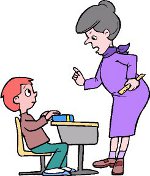
| 5 Going to school:
This is an age of exploration and continuing to finding one's self-identity and hidden talents and
skills. This is an exciting time, especially starting school for four
and five year olds. Many youngsters lack home discipline and need to learn discipline.
Children need discipline to learn. They make new friends, learn to
socialize and learn more values by participating in minor games and sports.
They begin to display concern about values.
By age
eight to nine, they have acquired, many cultural values, lifestyle
habits and addictive foods from their parents. By age 9, parental role
models are slowly being
replaced by the peer group.
|
 |
6 A challenging time of teen age puberty: Teens feel peer pressure influence. Teens seek
independence from parents. They want to be fashionable and accepted into
the peer group; and in doing so, risk becoming more addicted to junk food
and tempted to smoke, drink alcoholic beverages and experiment with
street drugs. They seek independence from parents and want to establish own independence.
Boys discover
girls! Time to explore how the biological body works.
Teens become concerned and confused about moral issues.
Discover and give expression to hidden
talents like singing voice, comedy, writing, music, science research, acting,
painting, and who they are. Teens discover their grandparents who give them a
self-identity.
This is also a time when significant others can influence teens to change behaviors like bad
junk foods, and habits, for a healthier diet and lifestyle. As teens get older and acquire more education and self confidence, they are
prone to break the hold that the peer group has on them. Exercise can become an addictive habit.
This is a time to explore how to become a better person.
|
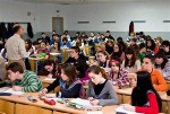 |
7 What to do after high school?
Teens can
get a manual low income job, go to a vocational school to learn a trade,
or go to university for higher education.
This
is a time to discover and learn more about future options.
This is a time to affirm that having a purpose in life is what gives you a reason to get out of bed in the morning. It gives you the energy and motivation to believe that today will be better than yesterday. It gives your life the meaning it needs to make everything worthwhile.
|
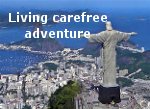 | 8 Carefree days: tasting the fruits of life with real freedom for a
few years and becoming more mature. This is an example of informal education.
A time to reflect on and rediscover life by having many learning experiences that shape who one is. Life without meaning is like a sailboat that has no rudder and no
direction. Meaning in life gives direction and a purpose to life.
This is a time of filling in the shortcomings of earlier education. Learn from personal experiences like hiking, learning to drive a car, and vacations.
Travel to different countries is one of the best ways to get an
education or learn about the world first hand.
Opportunity to explore a different kind of education: learning how the
human body works is a prerequisite for learning self-care and self-doctoring.
Take a parenting class before getting married.
|
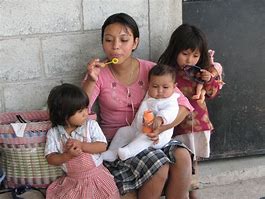 | 9
Falling in love, getting married and parenting are more wonderful life learning experiences. Parenting:
Mama is the most important teacher, when the kids are young. Hopefully, she makes wise
food choices, and with daddy, inculcates discipline, values and
behaviors by which to live.
But
consider taking a parenting class before becoming a parent.
Most parents are learning how to parent from their parents; or
they learn rearing children directly on the job as parents.
Therein lies what many parent do, often making many serious
mistakes in rearing their children.
Parents
need to continue learning to self-improve and explore their hidden
talents in cooking, sewing clothes, gardening, doing house maintenance,
dad updating his work skills, computer technology and so on. Life is a continuous learning experience.
|
 |
10 Grandparents: need to share their wisdom by
enforcing
parental values of living and help grandchildren learn how to make wise
decisions. Grandparents need to reinforce parents, giving their
grandchildren an identity and a moral rudder that help kids to steer
safely and wisely through life.
Older citizens can learn new ways of preventing chronic diseases, as well as provide the mind-brain with new first-time learning experiences.
Grandparents need to continue learning, make their mind-brain happy, and
keep themselves, young and well. Sorochan: Plasticity 2018
|
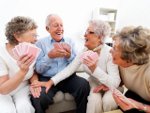 | 11 Seniors: celebrating the joys of life. They need to experience
new adventures as a way for the mind-brain to enjoy being active and
sustain life. They can continue to explore and learn new things, skills
and share their wisdom with the community.
|
The images above illustrate cultural learning [education at home] taking
place with parents, then the peer group influencing teenage behavior, school
education and adults using societal rituals and beliefs as a guide. But having information and understanding how children and adults learn is not
enough. We need to help parents adapt more agreeable values and behaviors that
coincide with school learning. At the same time, we need to resurrect some of the traditional aims of education,
learning about hidden talents, skills and update these with survival skills for the future.
One of the respected educators of early 1900 was Alfred Whitehead,
a mathematician and philosopher who taught at Harvard University late in his life. Late in his career he
became very interested in education and wrote a famous book called The Aims of Education, which is often used as a seminal text
by people interested in educational reform.
Quote from Whitehead's book:
"Culture is activity of thought, and receptivity to beauty and human feeling.
Scraps of information have nothing to do with it. A merely well-informed man is
the most useless; for he is a less bore on God's earth. What we should aim at producing is men
who possess both culture and expert knowledge in some special direction. Their
expert knowledge will give them the ground to start from, and their culture will
lead them as deep as philosophy and as high as art. We have to remember that valuable intellectual development is
self-development, and that it takes place between the ages of sixteen and
thirty. As to training, the most important part is given by mothers before the
age of twelve. It is not what they are at eighteen, it is what they become
afterwards that matters." Whitehead: The Aims of Education 1929
Here are some key ideas in Whitehead's philosophy of education: McDaniel: 12 principles of education by Whitehead 2020
1. The Subject of Education. The ultimate subject in
education is life in all it manifestations: human life but also the life of
the plants and animals, the earth, and the wider universe. The whole of nature is alive.
2. Creativity. Creativity is an essential dimension of life
and it is found at every level of existence. The planets and stars are
creative in their ways, and so are the quantum events within the depths of
atoms. Animals are obviously creative in their capacities for innovation
and adaptation. When educators stifle creativity, they are going against
the very grain of the universe.
3. Collaborative Creativity. We are not skin-encapsulated
egos cut off from the world by the boundaries of our skin; we are
persons-in-community whose very identities are established in relation to
others. Even if a person develops ideas in isolation, the ideas are a
synthesis of countless forms of creativity developed by others.
4. Intellect and Feeling. The Western Enlightenment was
mistaken to present the mind as if it were disembodied and disaffected,
separable from feeling and movement. The intellect ought not to be
separated from feeling. Even thinking is a form of feeling: a feeling of
ideas. This includes even mathematical thinking. It is a felt exploration of pure potentialities.
5. Multiple forms of Intelligence. It is a mistake to reduce
intelligence to science and mathematics, or even to book learning. There
are multiple forms of intelligence: kinesthetic, empathic, mathematical,
emotional, verbal, imaginative, and practical. All are important in different circumstances.
6. Aesthetic experience. Aesthetic experience plays an
important role in education, because all experience is aesthetic. The very
aim of education at its best is to provide people with ways of finding
beauty in their lives and adding beauty to the lives of others. Even wisdom
and compassion, even truth and goodness, are forms of beauty. Beauty
consists of satisfying forms of harmony and intensity.
7. The Problem of Inert Ideas. The problem with education
today is that it is focused on inert ideas. Inert ideas are ideas that are
treated in isolation from their relevance to life and the world, and in
isolation from their relevance to students. They are approached as
commodities or as objects, but not as lures for feeling, understanding, and
action. When ideas function effectively in education, they are alive with potentiality.
8. The Need for Romance. A good teacher must always remember
that there are three phases to education: romance, precision, and
generalization. The romantic stage occurs when students are introduced to
ideas that engage them, that are interesting, that make them feel more
alive. The precision can come later; but without romance where is no joy in education.
9. The Problem of Standardization. Education fails when it is
locked into standardization when it should be focused on personalization.
Each student is unique in his or her abilities, and in the particular forms
of 'intelligence' that bring him or her joy and can help him or her
contribute to the well-being of the world.
10. The Value of Learning by Doing. Education fails when it
forgets the wisdom of the body, and when it forgets that, often, the most
important kinds of learning occur through practice. Learning can occur from
body to mind as well as mind to body. This does not mean that book learning
is bad. To the contrary it is wonderful. But it's not enough
11. The Problem of Disciplinary Fragmentation. In higher
education today a central problem lies in the excessive specialization of
academic disciplines. Often university professors assume that their primary
goal is to introduce students into their academic guilds, forgetting that
education is in service to life. While specialization can be valuable, it
needs to be balanced by generalization, and trans-disciplinary studies.
12. Whole Person Education. At every level education needs to
be oriented toward the cultivation of whole persons who live satisfying
lives and who, at the same time, can contribute to the common good of their
communities and the world.
Most of these twelve principles can be applied to education at all levels today:
formal and informal, in public schools, at home, online and face-to-face,
secular and religious. Whitehead felt that we need good teachers who can bring
education down to earth. Whitehead's ideas could be referred to as
free market education that should take
place in time without burocratic or government interference. We need Whitehead's
ideas for education to be updated to 2020-2022 problems of living. The most important education 'health essentials for survival'
are ignored by schools: deep inhalation for oxygen, clean water, sunshine, sleep
and food. If a child does not get an adequate amount of oxygen, water, sunshine
and sleep, then the child suffers from poor
health that impedes learning. These four needs, as well as making wise food choices, are essential for wellbeing,
are not taught at home or school; and should be included as a top school curriculum priority. Personal health,
how to live, is not being taught in public schools today.
We can't assume that parents will show their children how to live. This is
learning that takes place silently and is not too transparent.
What's wrong with education today? Whitehead sums
the problem as inert education: "In the history of education, the most striking phenomenon is that schools of learning, which at one epoch are alive with a ferment of genius, in a succeeding generation exhibit merely pedantry and routine. The reason is, that they are over laden
with inert ideas. Education with inert ideas is not only useless: it is, above
all things, harmful. Except at rare intervals of intellectual ferment, education in the past has been radically infected with inert ideas."
This article would not be complete without mentioning
wisdom that Whitehead displayed in his senior years. Wisdom is complex and has been defined as what one
has learned from experience, information and education over time. It is the common sense of living. It is the quality of
having varied experiences, knowledge [education], understanding, having good values, being
rational and having a purpose in life. Having good judgment usually occurs as we get older; the quality of
being wise and making good decisions. Sorochan: Wisdom 2018
World countries, especially United States, need to cooperate internationally
and help do a wholesale revision of the global educational system, that starts with
early cultural parent education and then revamp the entire public school system.
This would probably take 20
years. This task is more important than stopping climate change, since it is
human behaviors, values and beliefs that are causing most of our world problems.
Educators today need to lean on those with
golden years of wisdom and not infantile politicians, parents and school teachers; for in
most instances they are self-serving and know not what they do!
References:
Barger Robert N., "A summary of Lawrence Kohlberg's stages of moral development." 2000.
Barger: Summary moral development 2000
Bates Anthony William, "Teaching in a digital age," 2.2 Epistemology and theories of learning, April 1, 2015.
Bates: Teaching in digital age 2015
Batey Anton, "The Trouble with No Child Left Behind," Ludwig Von Mises Institute, March 23, 2010.
Batey: trouble schools left behind 2010
Bawa Bhawna, "What are the aims of education?" Your Article Library.
Bawa: Aims of education
Berry Theodorea Regina & Matthew Reese Candis, "Cultural Identity and Education: A Critical Race Perspective," Educational Foundations, 2013.
Berry: Cultural identity and educaton 2013
Breiner Heather, Morgan Ford, and Vivian L. Gadsden,
Parenting Matters, National Academies Press (US); November 21, 2016.
Book Breiner: Parenting Matters 2016
Bornstein Marc H., "Cultural Approaches to Parenting," Parent Sci Pract. 2012 Jan 1; 12(2-3): 212–221.
Bornstein: Cultural parenting 2012
Derryberry Mayhew, "Today’s Health Problems and Health Education," Am J Public Health. 2004 March; 94(3): 368–371.
Derrybery: Health problems and health education 2004
Casey Doug, "Casey on Education," July 29, 2014.
Casey: education 2014
Caspi Avshalom, et al, "Children’s Behavioral Styles at Age 3 are Linked to Their Adult Personality Traits at Age 26," Institute of Psychiatry, Kings College London & University of Wisconsin-Madison Journal of Personality, 71(4), 2003, p. 496-513.
Caspi: Age 3 personality predicts adult behavior 2003
Curmath," What are the 3 types of education?" February 10, 2021.
Curmath: Types of education 2021
Daeg de Mott Dianne K. "Moral development- Stages of moral development," Web Solutions, 2021.
Daeg de Mott: moral development 2021
Doyle, Elaine and Joanna O'Flaherty, "The impact of education level and type on moral reasoning," Irish Educational Studies, 2013.
Doyle: Education level & morality 2013
Gin, "Education" Global Issues Network.
Gin: Education
Giorgetti Filiz Meseca, Craig Campbell & Ali Arsian, "Culture and education: looking back to culture through education," International Journal of the History of Education, Volume 53, 2017 -
International Standing Conference of the History of Education (ISCHE37) held in
Istanbul in 2015 , Special Issue: Culture and Education.
Giorgetti: Culture and Education 2017
Howard Kimberly, Anne Martin, Lisa J. Berlin, and Jeanne Brooks-Gunn, "Early Mother-Child Separation, Parenting, and Child Well-Being in Early Head Start Families." Attach Hum Dev. 2011 January 13(1): 5–26.
Howard: Early Mother-Child Separation, Parenting 2011
Kapur Radhika, "Cultural EducationDr," Cultural Education, July 2019.
Kapur: Culture education 2019
Kohlberg Lawrence, "Kohlberg's stages of moral development," Freegrab.net.
Kohlberg: Stages moral development
Labbas Rachida, "Epistemology in Education: Epistemological Development Trajectory," Journal of International Education and Leadership Volume 3 Issue 2 Summer 2013, pages 2161-7252.
Labbas: Epistemology of education 2013.
Liew Anthony, "Understanding Data, Information, Knowledge And Their Inter-Relationships," Journal of Knowledge Management Practice, Vol. 7, No. 2, June 2007.
Liew: Understanding data 2007
McDaniel Jay, "Whitehead and the 12 principles of education," May 2020.
McDaniel: 12 principles of education by Whitehead 2020
Naar David, "The Relationship Between Culture and Education," December 22, 2021.
Naar: Culture and education 2021
Rawls John, "A Theory of Justice," eNotes, Rawls: theory justice Rawls: another interpretation of Rawl
Silber Kenneth, "The learning system," Audiovisual Instruction, September 1972.
Silber: Learning system 1972
Surbhi S, "Difference Between Information and Knowledge," Key Differences, January 20, 2018.
Surbhi, Differences between knowledge & information 2018
Silverman, Allan, "Plato's Middle Period Metaphysics and Epistemology", The Stanford Encyclopedia of Philosophy (Fall 2014 Edition), Edward N. Zalta (ed.).
Silverman: Plato's epistemiology 2014.
Sorochan Walter, "Improving the Quality of Education," May 8, 2019.
Sorochan: Improving education 2019
Sorochan Walter, "Stages of moral development in education," Freegrab.net.
Sorochan: moral development
Sorochan Walter, "Wisdom" Freegrab.net, August 25, 2018.
Sorochan: Wisdom 2018
Sorochan Walter, "Plasticity,"
Freegrab.net. Sorochan: Plasticity 2018
White P. J. and P. H. Brown, "Plant nutrition for sustainable development and global health," National Library of Congress, Arril 20, 2010.
White: Sustainable nutrition 2010
Whitehead Alfred, The Aims of Education, Amazon, The Free Press, 1929.
Whitehead: The Aims of Education 1929
Wikipedia, "Lawrence Kohlberg's stages of moral development." Wiki: Stages of moral development
Credits: Walter Sorochan:
1. Expertise as a former public schools teacher
2. Emeritus Professor of Public Health and Health Education at San Diego State University.
3. As a professor, did research and wrote textbooks on how youngsters learn, how values develop, structuring curriculae, teaching methodology and other pedagogy.
4. Involved in helping to develop educational accountability legislation in the mid-‘70’s in California.










